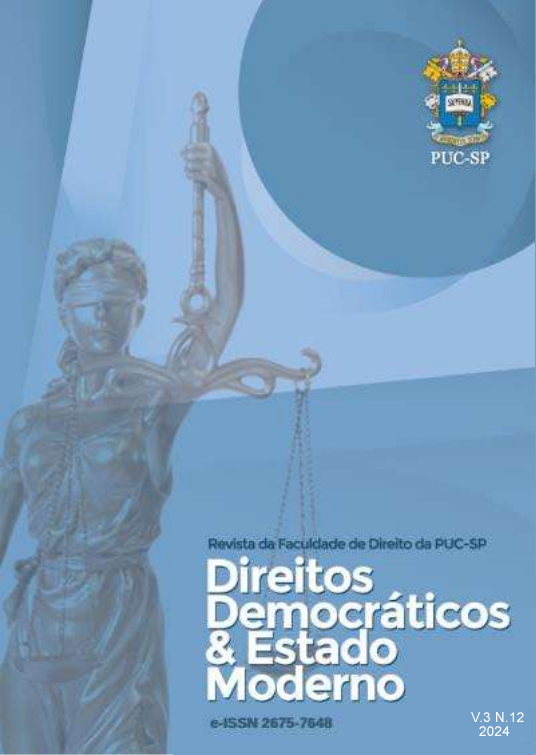The paradox of tolerance and democracy: essay on a form of response and the search for na inclusive dialogal democracy
DOI:
https://doi.org/10.23925/ddem.v.3.n.12.67733Keywords:
Democracy, Paradox of tolerance, Democratic responseAbstract
Considered victorious in the Contemporary Age, democracy becomes part of Politics and Law, a figure considered fundamental, and which best promotes the dignity of the person. As societies are dynamic within and among themselves, manifestations that diverge from democratic regime arise and are the subject of study and debate. Karl Popper introduces the divergence to democracy from the paradox of tolerance, which deals with how those intolerants of democracy should be treated by it. How to deal with these intolerants? This essay aims to problematize a border situation between Politics and Law through democratic success and how its premise of tolerance deals with the paradox coined by Karl Popper. There is more: the definition of democracy depends on the figure of tolerance, but both are constantly treated from a judicial perspective, especially by minorities. This text combats the subversion of the majority principle through the so-called tyranny of the minority, as democratic pillars must be developed under the aegis of the majority, clearly with respect for the juridical interests of all subjects.
References
ABBOUD, Georges. Ativismo judicial: os perigos de se transformar o STF em inimigo ficcional. São Paulo: RT, 2022.
ABBOUD, Georges. Democracia para quem não acredita. Belo Horizonte: Letramento, 2021.
BAUMAN, Zygmunt. Modernidade líquida. Tradução de Plínio Dentzien. Rio de Janeiro: Zahar, 2001.
BOBBIO, Norberto. O futuro da democracia: uma defesa das regras do jogo. 16. ed. Tradução de Marco Aurélio Nogueira. Rio de Janeiro: Paz & Terra, 2019.
BONAVIDES, P. Teoria constitucional da democracia participativa: por um Direito Constitucional de luta e resistência, por uma Nova Hermenêutica, por uma repolitização da legitimidade. São Paulo: Malheiros, 2001.
DAHL, R. A. Sobre a democracia. Tradução de Beatriz Sidou. Brasília: UnB, 2001.
DALLARI, Dalmo de Abreu. Elementos de teoria geral do Estado. 32. ed. São Paulo: Saraiva, 2015.
FRASER, Nancy. Da redistribuição ao reconhecimento? Dilemas da justiça numa era ‘‘pós-socialista’’. Tradução de Julio Assis Simões. Cadernos de Campo, São Paulo, n. 14/15, p. 231-239, 2006.
FROST, Ranier. The limits of toleration. Constellations, Oxford, v. 11, n. 3, p. 312-325, 2004.
G1. Vítimas da ditadura mostram revolta com pedidos de intervenção militar. Publicação de 29 mar. 2015, por Henrique Coelho, Rio de Janeiro: G1. Disponível em: https://g1.globo.com/rio-de-janeiro/noticia/2015/03/vitimas-da-ditadura-mostram-revolta-com-pedidos-de-intervencao-militar.html. Acesso em 02 out. 2023.
GOMES, Juan Pablo Ferreira. O paradoxo da (in)tolerância em Karl Popper e os limites-fronteiras do discurso de ódio. Revista Brasileira de Filosofia do Direito, Santa Catarina, v. 7, n. 2, p. 18-34, jul./dez. de 2021.
HALÉVY, Marc. A era do conhecimento: princípios e reflexões sobre a revolução noética no século XXI. Tradução de Roberto Leal. São Paulo: UNESP, 2010.
KAHNEMAN, Daniel; SIBONY, Oliver; SUNSTEIN, Cass R. Ruído: uma falha no julgamento humano. Tradução de Cássio de Arantes Leite. Rio de Janeiro: Objetiva, 2021.
KELSEN, H. Teoria geral do direito e do estado. 3. ed. Tradução de Luis Carlos Borges. São Paulo: WMF Martins Fontes, 2000.
LEVITSKY, Steven; ZIBIATT, Daniel. Como as democracias morrem. Tradução de Renato Aguiar. Rio de Janeiro: Zahar, 2018.
LEVITSKY, Steven; ZIBIATT, Daniel. The tyranny of the minority. New York: Crown, 2023.
LIMA, Martonio Mont’Alverne Barreto. O Tribunal Federal Constitucional alemão e a infeliz decisão sobre o NPD. Revista Conjur, São Paulo. Publicação de 18 jan. 2017. Disponível em: https://www.conjur.com.br/2017-jan-18/martonio-lima-infeliz-decisao-tribunal-constitucional-alemao. Acesso em 02 out. 2023.
MOREIRA ALVES, José Carlos. Direito romano. 18. ed. Rio de Janeiro: Forense, 2018.
MOROZOV, Evgeny. Big tech: a ascensão dos dados e a morte da política. Tradução de Claudio Marcondes. São Paulo: Ubu, 2018.
NEGRI, Antonio; HARDT, Michael. Multitude: war and democracy in the age of empire. London: Penguin Books, 2005.
PETRILLO, Pier Luigi. Teorias e técnicas do lobbying. Tradução de Antonio Araldo Ferraz Dal Pozzo e Augusto Neves Dal Pozzo. São Paulo: Contracorrente, 2022.
PLATÃO. A República. Tradução de Pietro Nassetti. São Paulo: Martin Claret, 2000.
PONTES DE MIRANDA, Francisco Cavalcanti. Tratado das ações: tomo I. 2. ed. São Paulo: RT, 1972.
POPPER, K. The open society and its enemies. New York and London: Routledge, 2002.
RUNCIMAN, David. How democracy ends. New York: Basic Groups, 2018.
SARAMAGO, José. Objecto quase. São Paulo: Companhia das Letras, 1994.
SENADO FEDERAL. Íntegra do discurso presidente da Assembleia Nacional Constituinte, Dr. Ulysses Guimarães. Brasília: Senado Federal. Publ. 06 nov. 2006. Disponível em: https://www.camara.leg.br/radio/programas/277285-integra-do-discurso-presidente-da-assembleia-nacional-constituinte-dr-ulysses-guimaraes-10-23/. Acesso em 23 set. 2024.
SUN TZU. A arte da guerra: os treze capítulos completos. Tradução de Elvira Vigna. São Paulo: Ediouro, 2009.
Downloads
Published
How to Cite
Issue
Section
License
Copyright (c) 2024 Democratic Rights & Modern State

This work is licensed under a Creative Commons Attribution 4.0 International License.
This work is licensed under a License Creative Commons Atribuição 4.0 Internacional.
The authors grant the journal all copyrights relating to the published works. The concepts issued in signed articles are the absolute and exclusive responsibility of their authors.
DD&EM Magazine - ISSN 2675-7648

















